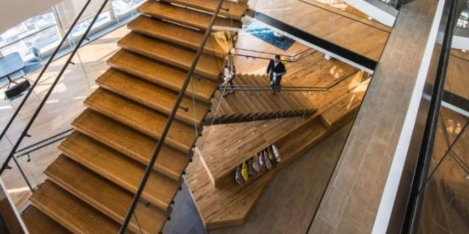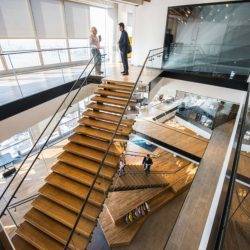February 20, 2017
Digital workplace is ineffective without workers’ technical empowerment 0

Shifting digital dynamics are reshaping the way organisations operate and are recasting the traditional route to business success, claims new research into the rise of the digital workplace. Ricoh’s new report into digital workplace trends produced in partnership with polling company Censuswide, argues that the latest technology strategies are rendered useless without proper commitment to skills training and the empowerment of those workers who will be making use of it. It advises that businesses need to work on improving the workforce’s digital dexterity by creating an office culture fit for sharing ideas and skills across social, video and digital platforms. The report identifies digital skills training as a key differentiator for employees seeking a new job. Over a third of UK office workers (37 per cent) say they would move jobs to a company which offered better digital skills in the workplace. Likewise a modest 18 per cent of respondents rated their skills as ‘excellent’ whilst 51 per cent said ‘good’ and 30 per cent considered themselves ‘average.’







 Employees would like more freedom and flexibility at work with over half believing that the structure and culture of their workplaces are holding them back from doing their job more effectively (55 percent and 53 percent respectively). That’s according to new research from ILM, which has launched a new
Employees would like more freedom and flexibility at work with over half believing that the structure and culture of their workplaces are holding them back from doing their job more effectively (55 percent and 53 percent respectively). That’s according to new research from ILM, which has launched a new 
 Nearly three quarters of European employees would consider career opportunities abroad, with Germany voted the most desirable place to work claims a new study of nearly 10,000 working adults across Europe. According to research by ADP which looked at how employees feel about the future of work, international competitiveness and talent management, European employees have a strong appetite for international work, as almost three quarters (74 percent) would consider other countries for career opportunities. At 21 percent, Germany tops the list of most popular places to relocate, with the United Kingdom (15 percent) and France (12 percent) in second and third place; with North America surprisingly coming in much further down the list in 12th place. Despite their popularity, Germany, the UK and France aren’t particularly strong in any of the areas measured in the survey, such as skills and development, flexible working options and stress in the workplace.
Nearly three quarters of European employees would consider career opportunities abroad, with Germany voted the most desirable place to work claims a new study of nearly 10,000 working adults across Europe. According to research by ADP which looked at how employees feel about the future of work, international competitiveness and talent management, European employees have a strong appetite for international work, as almost three quarters (74 percent) would consider other countries for career opportunities. At 21 percent, Germany tops the list of most popular places to relocate, with the United Kingdom (15 percent) and France (12 percent) in second and third place; with North America surprisingly coming in much further down the list in 12th place. Despite their popularity, Germany, the UK and France aren’t particularly strong in any of the areas measured in the survey, such as skills and development, flexible working options and stress in the workplace.











 Amos Tversky and Daniel Kahneman introduced the concept of Loss Aversion in 1984, highlighting people’s tendency to strongly prefer avoiding losses to acquiring gains. Most studies suggest that losses are twice as powerful, psychologically, as gains. Lose £100 and we will feel a remorse that easily outweighs winning £100. In a similar fashion we find it very hard to see future positives when confronted with short term loses. We understand easily what we have lost but cannot imagine what there is to be gained. Furthermore, as Frederic Bastiat wrote in an 1850 paper, “That Which is Seen, and That Which is Not Seen”, man has a tendency to “pursue a small present good, which will be followed by a great evil to come, rather than a great good to come, at the risk of a small present evil”. Put these together and it is no wonder that, by and large, the future of work, corporate real estate and the workplace is so widely misunderstood.
Amos Tversky and Daniel Kahneman introduced the concept of Loss Aversion in 1984, highlighting people’s tendency to strongly prefer avoiding losses to acquiring gains. Most studies suggest that losses are twice as powerful, psychologically, as gains. Lose £100 and we will feel a remorse that easily outweighs winning £100. In a similar fashion we find it very hard to see future positives when confronted with short term loses. We understand easily what we have lost but cannot imagine what there is to be gained. Furthermore, as Frederic Bastiat wrote in an 1850 paper, “That Which is Seen, and That Which is Not Seen”, man has a tendency to “pursue a small present good, which will be followed by a great evil to come, rather than a great good to come, at the risk of a small present evil”. Put these together and it is no wonder that, by and large, the future of work, corporate real estate and the workplace is so widely misunderstood.










